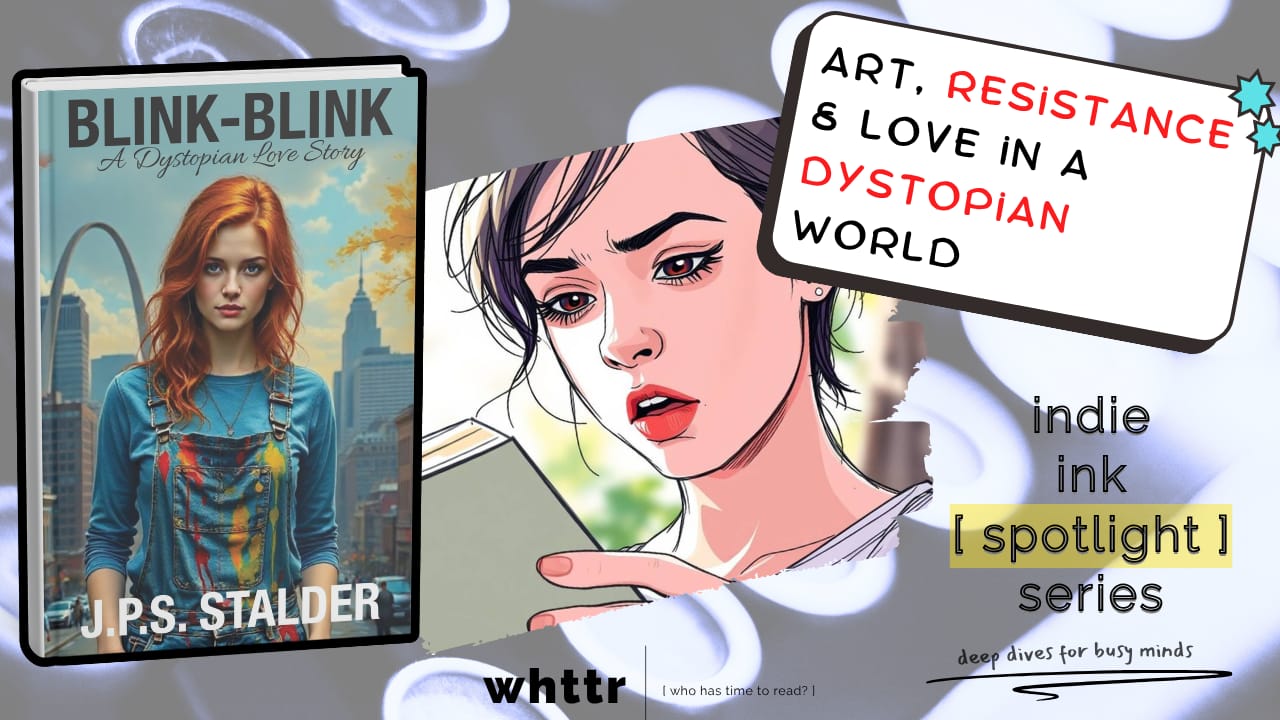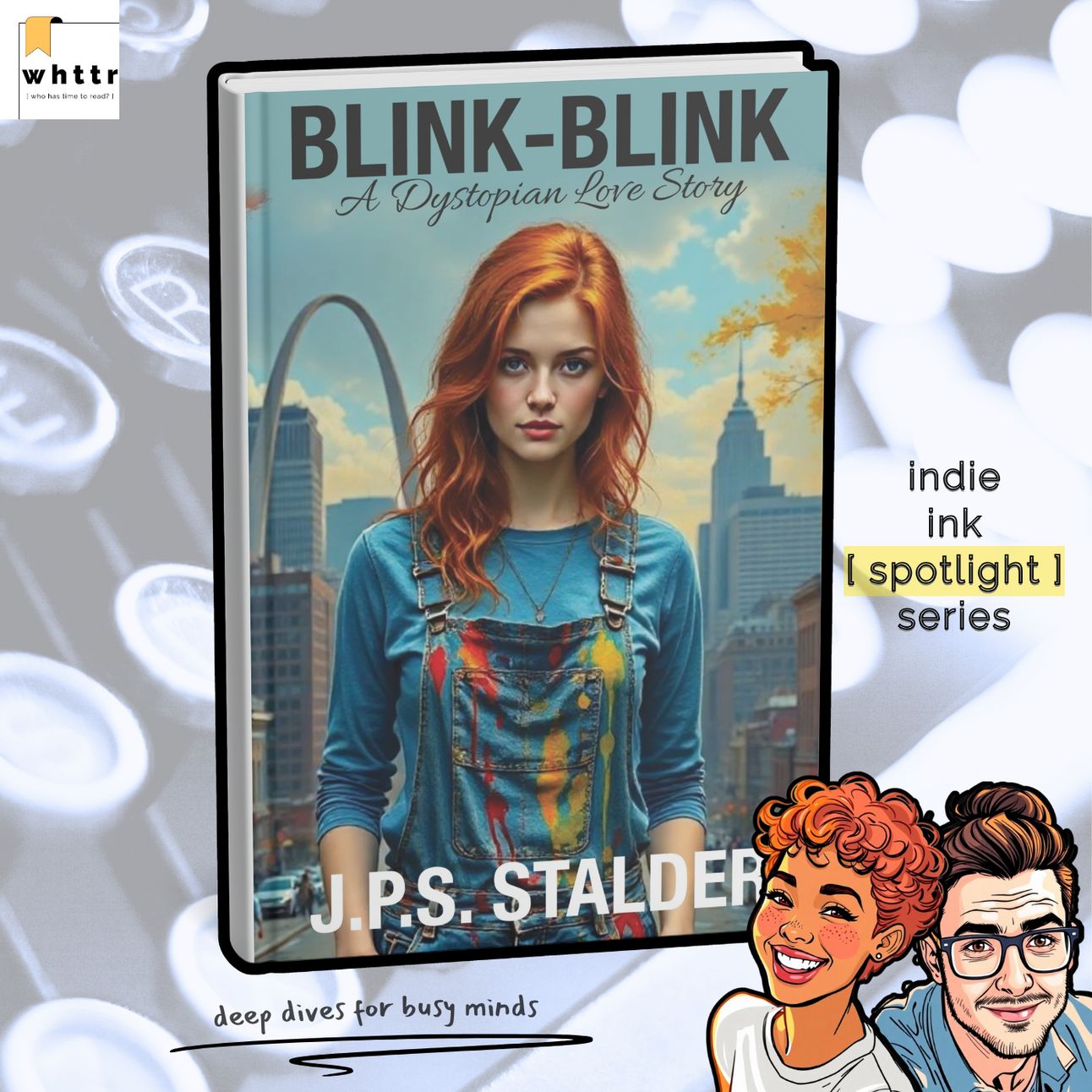- whttr
- Posts
- When the World Censors Everything, Art Fights Back
When the World Censors Everything, Art Fights Back
This One’s for the Thought Criminals
Some stories entertain. Others provoke. BLINK-BLINK does both—and then asks you what you’re going to do with the discomfort it leaves behind.
This week on Indie Ink Spotlight, we’re stepping into a story that’s part dystopia, part love letter to rebellion, and fully committed to making you feel something. BLINK-BLINK by J.P.S. Stalder is a speculative novel about censorship, AI, resistance, and human connection—all wrapped in warm narrative layers and unsettling truths.
And yet, at the core of all the cultural critique, digital surveillance, and artistic resistance—this is a love story. The kind that asks not just what you're willing to risk for someone else, but what you’re willing to remember about yourself.
First Lines
Imagine a world where truth has been outlawed, where creativity is controlled, and where even a blink could betray you.
That’s the world of BLINK-BLINK: a dystopian love story. But don’t let the genre label fool you—this isn’t just dystopia for dystopia’s sake. J.P.S. Stalder’s novel takes the trappings of post-truth futures and weaponizes them not for spectacle, but for sincerity. It’s part Orwell, part Bradbury, part late-night conversation you weren’t ready for but needed anyway.
We meet Blair—a young artist in a society numbed by surveillance, sanitized language, and the illusion of choice. But what drives the story isn’t rebellion for rebellion’s sake. It’s the smaller, more intimate fight: the struggle to keep loving, creating, and remembering in a culture built to suppress all three.
“This is a rebellion of the spirit,” Stalder says. “It’s about beauty as resistance. Emotion as rebellion. Connection as a form of survival.”
He doesn’t shy away from layering the story with metaphor. AI censorship, vanished books, and an obsession with virtual pacification—these aren’t far-future nightmares, they’re lightly exaggerated reflections of our present. Yet, for all its urgency, the book never loses its warmth. Stalder’s prose carries an emotional intelligence that grounds the world in real heartbeats. A standout moment arrives quietly in Chapter 15—a deeply personal exchange that unfolds not with fireworks, but with an almost sacred stillness. “That scene was for my dad,” Stalder admits. “It’s fictional, but it’s what I wish had existed. That softness, that repair.” From line one, BLINK-BLINK challenges the reader not just to think—but to feel. And in a world that’s increasingly hostile to both, that makes this story revolutionary. |
Between the Lines
What drives a dystopian love story in the modern era? What does rebellion look like when the world rewards silence? Stalder offers a glimpse behind the curtain—and it’s as honest and layered as the novel itself.
What inspired this book—and why now? “Watching AI and social media shape—and often censor—public discourse made me want to write something that reminded people of what’s at stake. This isn’t a left vs. right issue. This is a ‘Republic, so long as they can keep it’ thing.” | What nearly stopped this book from existing? “Fear. Doubt. Time. But mostly fear. I’d stopped writing fiction for years after rejection. What brought me back was loss, a pandemic, and finally hearing someone say: 'Write shit. Just write. You can make it pretty later.'” | What do you hope readers walk away with? “I want them to think and feel. I don’t give answers. I want to challenge them to wrestle with big questions—then go out and talk about them. Freedom, connection, and voice—that’s what’s really at stake.” |
Margins & Meanings
“Art is intrinsically valuable,” he writes. “When we treat it only as a means to an end—likes, sales, rankings—we kill what makes it powerful in the first place.” |  |
J.P.S. Stalder didn’t just write BLINK-BLINK to make a point—he wrote it because the point was being erased. In a world of recycled plots, polarized media, and algorithm-optimized storytelling, his goal wasn’t to “go viral.” It was to preserve a kind of creative soul that feels endangered.
As an indie author, Stalder leaned into freedom rather than formula. He self-published because he refused to compromise: not on the pacing, the themes, or the story’s ability to challenge readers without spoon-feeding conclusions. That risk paid off. BLINK-BLINK is the kind of book that might not tell you what to think—but it will insist you think harder, longer, and more vulnerably than before.
His characters don’t just reflect ideas; they reflect a culture under pressure. “We’re saturated with distraction and disconnection,” he says. “But books can still cut through that. They can still remind us who we are, and what we’re meant to notice.”
There’s a quiet defiance in BLINK-BLINK—a commitment to telling the truth as fiction. To holding the line against homogenized storytelling. And to writing with the hope that someone, somewhere, still craves something real.
Shelf Life
The Last Page
Some books exist to remind us who we are before the world taught us to behave. BLINK-BLINK is one of those. It’s messy, honest, a little bit wounded—and it dares to be beautiful anyway.
We're proud to feature J.P.S. Stalder this week on Indie Ink Spotlight, and just as excited to share that his latest novel, Sentinels in the Oakwood, is now available.
Set more than a century after nuclear war, Sentinels explores a post-apocalyptic Missouri Ozarks where wilderness reigns, ancient tech still lives underground, and robotic guardians—called sentinels—haunt the imagination of a new world. It’s a high-concept, emotionally rich blend of survival, leadership, and community that challenges what it means to rebuild.
Two stories. One bold voice. And a growing body of work that refuses to flinch.
Every Saturday, WHTTR’s Indie Ink Spotlight brings you one story, one voice, and one reason to keep reading.
After all, who has time to read?
We do. Together.
The WHTTR Team
✉ Share Your Story Next
Got something to say that doesn't fit the mold?
We’re always looking for indie authors with something real to say. Indie Ink Spotlight is a home for bold voices, true stories, and the kinds of books that stay with you after the last page.
To be considered for a future feature,
📬 email us at [email protected]
with the subject line: Community Exchange
We'll take it from there.
Published by ONE Media
Disclaimer: Some links contain affiliate links, meaning WHTTR will earn a small commission when you purchase through our link at no additional cost to you. As an Amazon Associate, we earn from qualifying purchases.


Reply